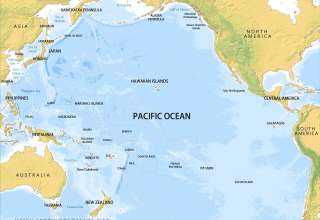By Bevan Ramsden
The United States is increasing its military footprint on Australia and Pacific and Pacific Rim countries as it prepares for war against China. In Australia, the Force Posture Agreement (FPA) and large scale war exercises such as Talisman Sabre and RIMPAC, integrate our ADF with the US military and under the US Indo-Pacific Command in preparation for such a war scenario. IPAN is calling for the cancellation of both the FPA and AUKUS as steps to keep Australia out of such a potentially disastrous war.
The United States is gearing up for war with China, most likely over Taiwan, but it cannot fight such a war from the U.S west coast. It needs the co-operation and support of its Pacific and Pacific Rim allies so as to have unimpeded access to their seaports, airports, logistics support and equipment, and munitions manufacturing and storage facilities. Additionally, the U.S needs its armed forces and those of its allies to be fully integrated and under its Indo-Pacific Command. Large scale military exercises such as Talisman Sabre and RIMPAC are aimed at developing that integration and operational experience.
This U.S process of setting up its allies to support a war against China has been proceeding with an ever-increasing pace since the 2011 announcement by U.S President Obama, with the effusive support of Prime Minister Gillard, of the U.S “Pivot to Asia” strategy. Subsequently the Force Posture Agreement (FPA) was signed in 2014 between the U.S and Australian Governments.
The FPA lasts for 25 years and can be terminated by either party with one year’s notice. It is crucially important in enabling the U.S military build-up in Australia.
Article II states: “…this Agreement provides the necessary authorisations for the United States to conduct mutually determined activities under the Force Posture Initiatives in, from or through Australia.
Article IV of the FPA states: “United States Forces and United States Contractors shall have unimpeded access to and use of Agreed Facilities and Areasfor activities undertaken in connection with this Agreement”
and: “Australia hereby grants to the United States operational control of Agreed Facilities and Areas.”
Senator David Shoebridge questioned the Department of Defence regarding “Agreed Facilities and Areas” and was told that these include:
- Darwin and NT training areas such as the Mount Bundey Training Area, the Bradshaw Field Training Area and Delamere Air Weapons Range.
- Airfields and facilities at RAAF Amberley (Qld), Curtin (WA), Scherger (Qld), Learmonth (WA) and Tindal (NT)
- HMAS Stirling in WA for porting of UK and US nuclear-powered submarines
- Logistics Centre at Bandiana (Vic)
Part 3 of Article VII states: “As mutually determined by the Parties, aircraft, vehicles, and vessels operated by or for United States Forces shall have access to aerial ports and seaports of Australia and other locations, for the delivery to, storage and maintenance in, and removal from the territory of Australia of United States Forces’ prepositioned materiel.”
In addition to its Bandiana logistics centre, the U.S has used the holding of the Talisman Sabre war exercises to expand its stores and munitions centres in Australia by opening a new facility in Townsville.
The U.S military publication ‘Defence News’ reports that:
“The U.S. Army will test a nascent capability to effectively preposition equipment and supplies forward in the Pacific theater in Australia during the large-scale exercise Talisman Sabre kicking off this month, according to U.S. Army Pacific Command commander Gen. Ronald Clark.
“The Army has so far established one center in the Philippines and one in Australia, for which the service is directly responsible. The other services are tasked with building out more centers across the first and second island chains in the Pacific, key archipelagos stretching from Japan through Taiwan and down to Borneo in the south Pacific.”
The U.S also has Papua-New Guinea in its sights for pre-positioning munitions and materials and use of its ports and airfields, having signed a Defence Co-operation Agreement (DCA) with P-NG in 2023.
The official text of the DCA, which will be in force for 15 years, was made public in June 2023. The DCA grants the U.S “unimpeded access” to six mutually agreed facilities, ports and airports, including the U.S, P-NG and Australian-developed Lombrum Naval Base on Manus Island.
This rapid U.S military build-up in Australia and the Pacific Rim countries to the north, testifies to the seriousness of the preparations for war against China, a war which will unavoidably involve Australia and other regional U.S allies.
Such Australian involvement in a U.S war against China, our major trading partner, would be a catastrophe for our people. Such a war would wreck our economy, causing major job losses and shortages of essential items. It would likely cause a serious deterioration in community relations as well as inviting retaliatory strikes on U.S military installations and surrounding areas.
The Independent and Peaceful Australia Net (IPAN) held recently a well- attended webinar to launch a nation-wide campaign calling for cancellation of AUKUS and the Force Posture Agreement. Speakers at this event emphasised the dangers posed by these two Agreements and the role they would play in integrating Australia into a U.S war on China.
Doug Cameron, former ALP Senator and member of Labor Against War, said that:
‘We should make it clear to the US that we will retain our sovereign right not to be caught up in a war with a major trading partner, and we should insist that we will not engage in a war over Taiwan.’
Retired Major-General Michael Smith said:
‘One thing is certain, the worst possible outcome for Australia is war between China and the US, in which we become involved, and most likely would suffer collateral damage.’
‘We need to withdraw military assets from the South China Sea, where so-called freedom of navigation operations are likely to cause a major conflict.’
Human Rights Lawyer and journalist Kellie Tranter said:
‘The combined effect of the Force Posture Agreement, and other defence agreements with the United States is to nullify Australia’s capacity to make independent decisions about war avoidance and war fighting.’
‘Together, they lock us into providing the United States, first, with secured areas under its control, from which it may conduct a war; and second, with comprehensive logistical support for any such folly.’
Recently, Prime Minister Albanese refused to be drawn by U.S Defence Under-Secretary Elbridge Colby into committing Australia to a war against China over Taiwan and also refused to increase Australian military expenditure up to 3.5% of GDP as urged by the U.S Defence Secretary Pete Hegseth.
PM Albanese and his government should be encouraged to stand firm against this U.S pressure, chart an independent course for Australia, keep us out of foreign wars and help promote peaceful relations in our region.
The campaign by IPAN calling on the government to cancel AUKUS and terminate the Force Posture Agreement, would be significant steps in this direction. This call can be signed at https://ipan.org.au/public-call-to-the-australian-government/








